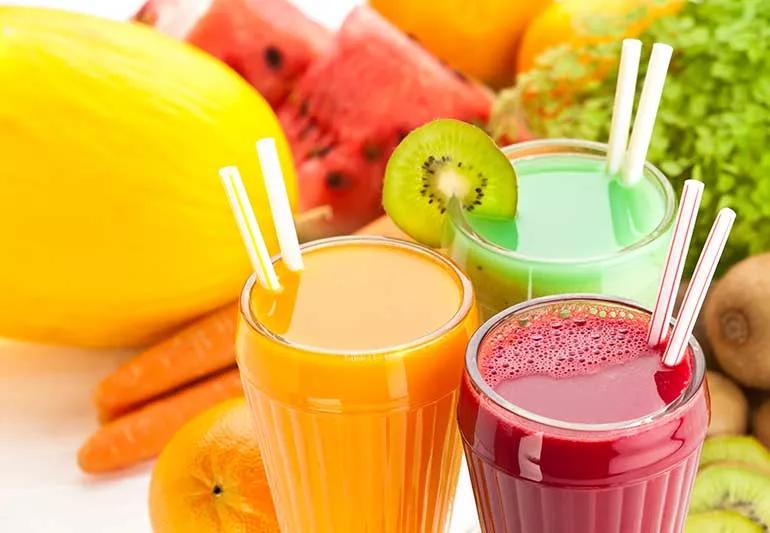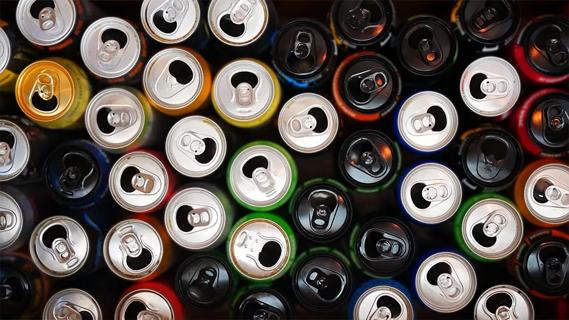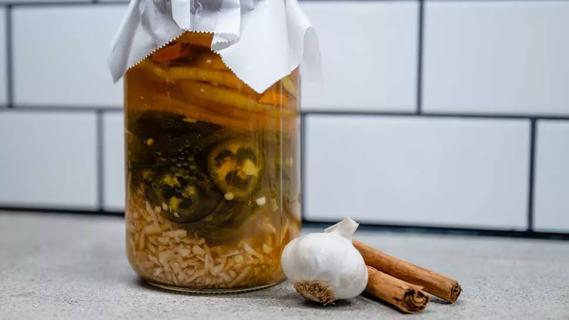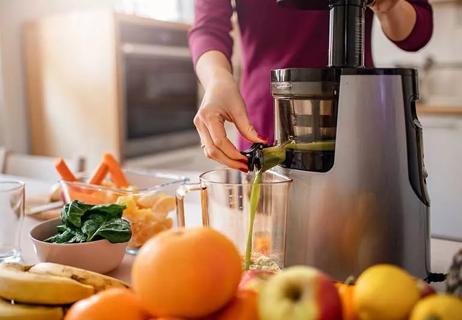Juice contains vitamins and nutrients, but high levels of sugar call for moderation

Drinking 100% fruit juice certainly sounds like a perfect choice for your health, but that’s not necessarily a 100% accurate assessment.
Advertisement
Cleveland Clinic is a non-profit academic medical center. Advertising on our site helps support our mission. We do not endorse non-Cleveland Clinic products or services. Policy
Sure, there are positives to drinking fruit juice — starting with an impressive list of vitamins and nutrients that fill every glass. But 100% fruit juice is also loaded with enough sugar to draw unflattering comparisons to soda.
Kind of surprising, right? Well, to get a better understanding of the pros and cons of juice, let’s squeeze some information out of registered dietitian Beth Czerwony, RD.
If what you’re drinking is 100% fruit juice, it’s basically liquid that has been pressed, squeezed or otherwise extracted from fruit. Glance at the nutrition labels on these bottles and you should see familiar fruit names.
Drinks with a lower percentage of fruit juice — 10%, for example — carry different labeling. You’ll find these on the shelf under names like:
Check the ingredient list on these bottles and you’ll probably see added sweeteners such as high-fructose corn syrup.
Fruit juice contains many of the vitamins and nutrients that make fruit a recommended part of a healthy diet. The U.S. Department of Agriculture recommends eating about 2 cups of fruit per day.
What is a “cup” of fruit? Glad you asked! If fruit is in its natural form, that’s roughly equal to a large orange or banana, a small apple or eight strawberries.
Advertisement
When juiced, a cup of fruit is … well, an 8-ounce cup of juice. (We’ll come back to that number.)
The short answer is no. Some of the fabulous benefits of fruit disappear during the juicing process. The biggest loss is in fiber content, a perk of whole fruit that is great for your digestive system.
Whole fruit also gives you more of a full-belly feeling than juice given the “fruit meat” you consume. That means you’ll be less apt to get hungry 30 minutes later and start foraging for snacks.
“You get so much more than just juice when eating whole fruit,” notes Czerwony. “It’s not the same thing.”
Many types of fruit are packed with natural sugars — one of the reasons fruit is often dubbed “nature’s candy.” When you juice fruit, you concentrate that sugar into one extremely sippable drink.
Think of it this way, says Czerwony: It might take the juice of five or six oranges to fill a cup. That’s a lot of sugary fluid, which can cause an immediate spike in blood sugar levels.
Let’s put some numbers to it. A glass of orange juice contains about 23 grams of sugar — which isn’t far off the daily limit of sugar recommended by the American Heart Association. (The AHA recommends no more than 36 grams of sugar for men and 25 grams for women.)
“So, a single cup of orange juice basically has all the sugar you should have in a day,” says Czerwony. “And how many of us only have an 8-ounce glass of juice? It’s usually more.”
The high-sugar content in juice nearly matches what’s found in sugary sodas, which are not exactly known for being healthy. (The vitamins in juice make the drink better for you than soda, of course.)
“But if you’re looking at it from a sugar perspective, they’re basically one and the same,” notes Czerwony.
Is sugar in juice a bit of a concern? You bet. But there’s also the reality that many people simply don’t fill their diet with much fruit.
The Centers for Disease Control and Prevention (CDC) reports that only about 12% of adults in the United States consume the recommended amount of fruit per day. Juice consumption is included in the tally.
So, in many ways, consuming too little fruit stands as a bigger issue than people drinking too much 100% fruit juice.
“Juice is an easy way to add servings of fruit to your diet, and there’s nothing wrong with enjoying a glass,” says Czerwony. “The key is moderation. Just make sure you’re not overdoing it.”
Advertisement
Learn more about our editorial process.
Advertisement

Options for sober social drinking are abundant, but be mindful about additives and triggers

Pickle juice has a reputation as a probiotic powerhouse, workout recovery aid, hangover cure and more

If you’re looking to boost your gut health, it’s better to get fiber from whole foods

While it isn’t bad for you, celery juice isn’t the detox phenom it’s claimed to be

Regularly drinking these sugar-fueled, stimulant-laden beverages can increase your risk of adverse health effects

This spicy concoction can do more harm than good, upsetting your stomach and causing painful acid reflux

Juicing removes beneficial fiber from fruits and veggies and raises your blood sugar

Sports drinks can give your body a boost, but it’s important not to overuse them

The tropical fruit is a good source of antioxidants and vitamin C

Most people fall asleep within 10 to 20 minutes, but if your experience is different, adjusting your sleep schedule may help

Exploring your hidden side can lead to better understanding of what makes you tick